
Every day I see the positive impact that Instagram has for young people everywhere. I’m proud that our platform is a place where teens can spend time with the people they care about, explore their interests, and explore who they are.
I want to make sure that it stays that way, which means above all keeping them safe on Instagram. We’ll continue doing research, consulting with experts, and testing new concepts to better serve teens.
Today, I’d like to clarify some of the work that we’ve been doing for a long time, and also lay out a few new things that we’ve been developing to meaningfully improve the experience on Instagram for teens, parents and guardians. This includes developing new tools for parents and guardians and launching Take A Break.
Parents and guardians know what’s best for their teens, so we plan to launch our first tools in March to help them guide and support their teens on Instagram. Parents and guardians will be able to view how much time their teens spend on Instagram and set time limits. We’ll also give teens a new option to notify their parents if they report someone, giving their parents the opportunity to talk about it with them. This is the first version of these tools; we’ll continue to add more options over time.
We’re also developing a new educational hub for parents and guardians that will include additional resources, like product tutorials and tips from experts, to help them discuss social media use with their teens.
It’s important to me that people feel good about the time they spend on Instagram, so today we’re launching Take A Break to empower people to make informed decisions about how they’re spending their time. If someone has been scrolling for a certain amount of time, we’ll ask them to take a break from Instagram and suggest that they set reminders to take more breaks in the future. We’ll also show them expert-backed tips to help them reflect and reset.
To make sure that teens are aware of this feature, we’ll show them notifications suggesting they turn these reminders on. We’re encouraged to see that teens are using Take A Break. Early test results show that once teens set the reminders, more than 90% of them keep them on. We’re launching this feature in the US, UK, Ireland, Canada, Australia, and New Zealand today, and we’ll bring it to everyone by early next year. 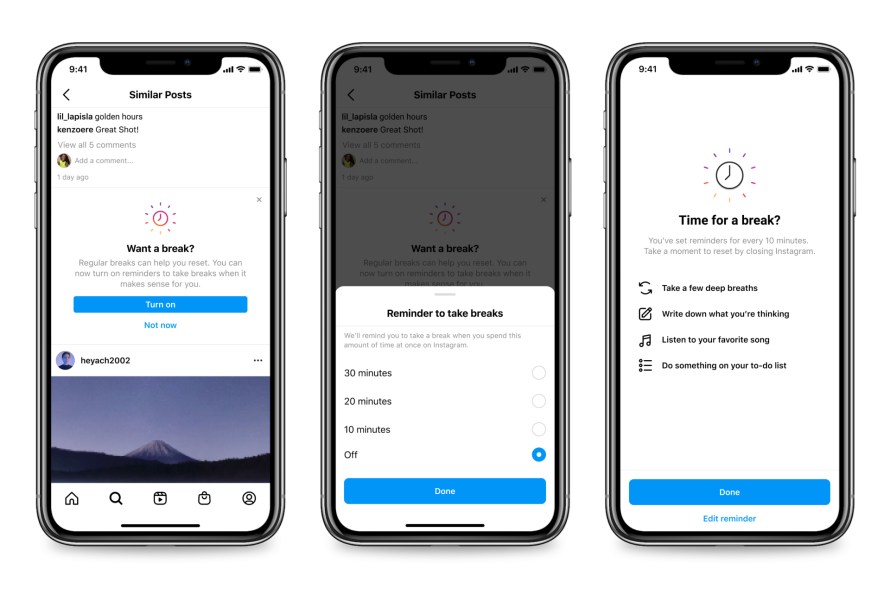
The Take a Break reminders build on our existing time management tools including Daily Limit, which lets people know when they’ve reached the total amount of time they want to spend on Instagram each day, and offers the ability to mute notifications from Instagram.
We’re encouraged that experts see the value of these features, including Boris Radanović, UK Safer Internet Centre, who said, “We welcome Instagram’s new Take A Break feature, which we hope will be a meaningful way to encourage healthy social media use, particularly among younger users. Whilst taking regular breaks from screens has been challenging recently, it has been good advice for many years, and initiatives that encourage this are to be supported. We will continue to work with Instagram in this regard and hope that this represents a step in the right direction.”
Anne Collier at The Net Safety Collaborative, who said, “I love ‘Take a Break’ because it gives young users better control over their experiences on Instagram. Because we know that agency – the power to make choices and take action – is vital to adolescent wellbeing and mental health,” and Dr. Alfiee M. Breland-Noble, a psychologist and founder of mental health nonprofit the AAKOMA project, who said, “It is imperative that we equip a diverse population of Gen Z and Gen Alpha youth with the necessary coping skills and tech tools to help them effectively manage their social media use. The well-being of diverse teens, including marginalized youth who face a host of unique societal challenges, is an imperative for me. It was therefore my pleasure to contribute my 25+ years of scientific and clinical knowledge to the development of the ‘Take a Break’ feature for Instagram. This feature is one necessary positive tool to support young people’s well-being within the context of healthy social media engagement.”
We’re also starting to test a new experience for people to see and manage their Instagram activity. We know that as teens grow up, they want more control over how they show up both online and offline so, for the first time, they will be able to bulk delete content they’ve posted like photos and videos, as well as their previous likes and comments. While available to everyone, I think this tool is particularly important for teens to more fully understand what information they’ve shared on Instagram, what is visible to others, and to have an easier way to manage their digital footprint. This new experience will be available to everyone in January.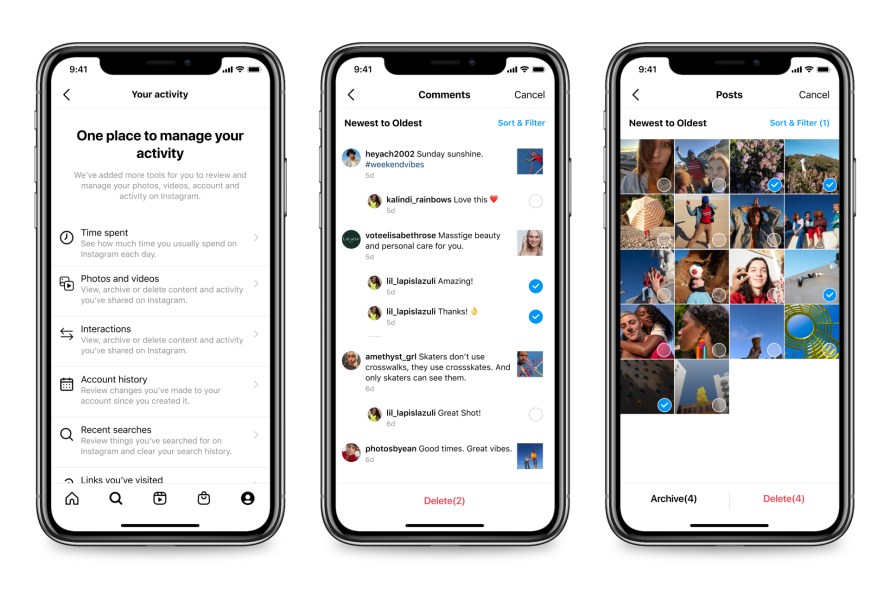
Earlier this year, we began defaulting teens into private accounts when they signed up for Instagram, and we stopped adults from being able to DM teens who don’t follow them.
Now, we’ll also switch off the ability for people to tag or mention teens who don’t follow them, or to include their content in Reels Remixes or Guides by default when they first join Instagram. We’re testing these changes to further minimize the possibility that teens will hear from those they don’t know, or don’t want to hear from, and plan to make them available to everyone early next year. 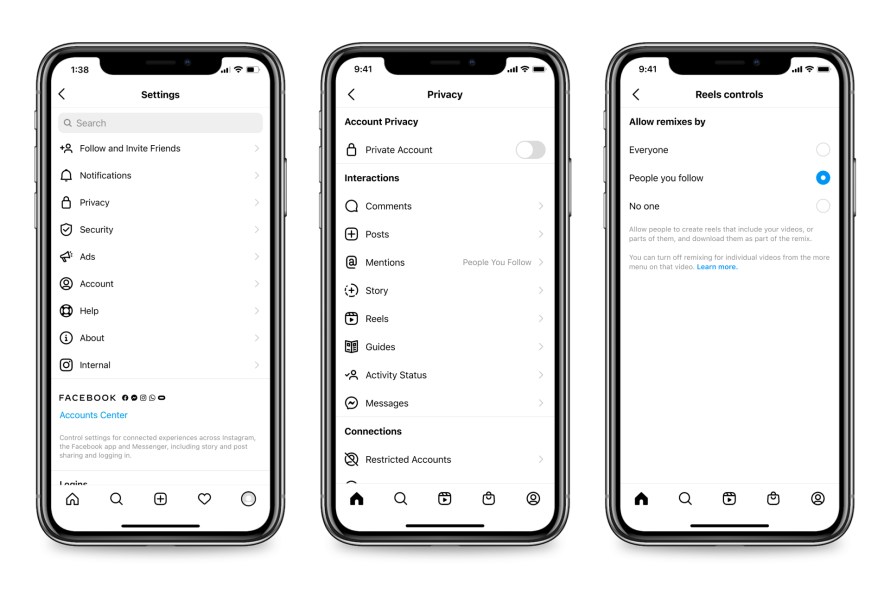
In July, we launched the Sensitive Content Control, which allows people to decide how much sensitive content shows up in Explore. The control has three options: Allow, Limit and Limit Even More. “Limit” is the default state for everyone and based on our Recommendation Guidelines, “Allow” enables people to see more sensitive content, whereas “Limit Even More” means they see less of this content than the default state. The “Allow” option has always been unavailable to people under the age of 18.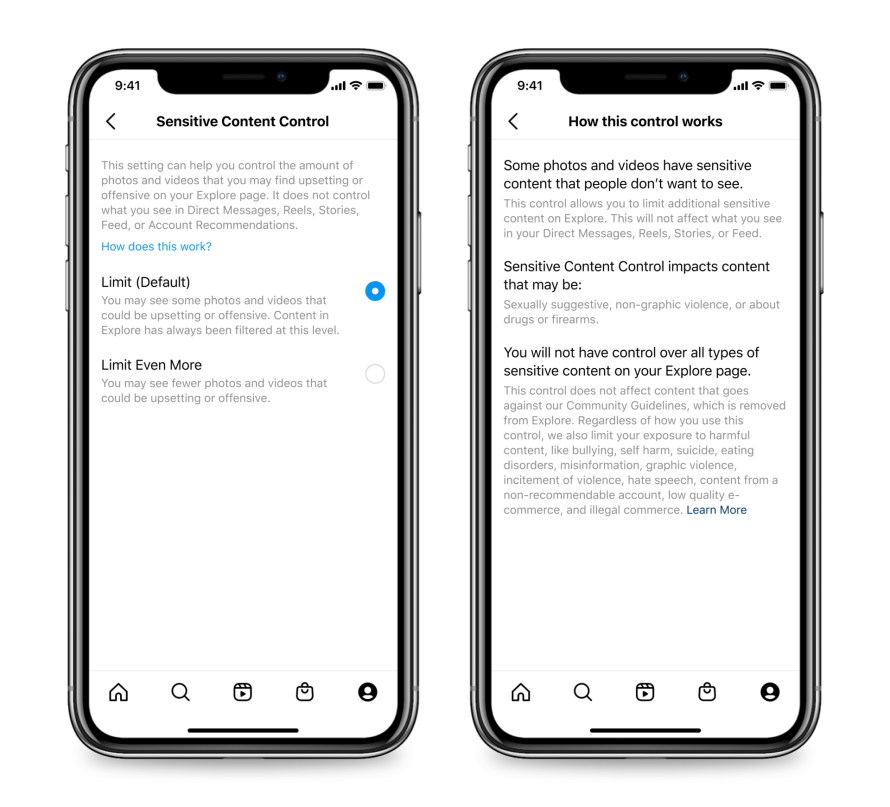
We’re exploring expanding the “Limit Even More” state beyond Explore for teens. This will make it more difficult for teens to come across potentially harmful or sensitive content or accounts in Search, Explore, Hashtags, Reels and Suggested Accounts. We’re in the early stages of this idea and will have more to share in time.
Lastly, our research shows — and external experts agree — that if people are dwelling on one topic for a while, it could be helpful to nudge them towards other topics at the right moment. That’s why we’re building a new experience that will nudge people towards other topics if they’ve been dwelling on one topic for a while. We’ll have more to share on this, and changes we’re making when it comes to content and accounts we recommend to teens, soon.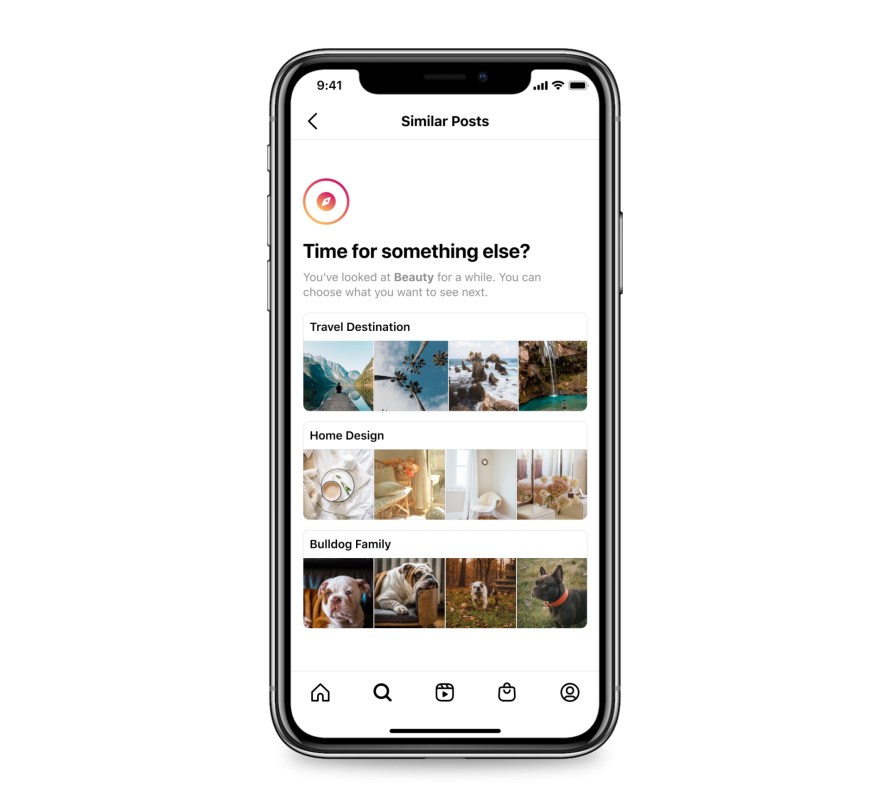
Dr. Phillippa Diedrichs, a Professor of Psychology at the Centre for Appearance Research at the University of West England Bristol, agreed that nudging techniques show promise, saying “over the past eight months, I’ve been working with the Instagram team to brainstorm ways to help users have a positive experience and avoid social comparisons. Nudges are a behaviour change technique studied by behavioural economists for over a decade. They’ve been applied successfully to issues like climate change, employee well-being and altruism. More recently, digital nudges have been studied as a way to improve users’ experiences online without compromising their freedom and personal choice.”
This is just a snapshot of our work. We’re also continuing to develop innovative new solutions to verify people’s ages on Instagram, for example.
As always, I’m grateful to the experts and researchers who lend us their expertise in critical areas like child development, teen mental health and online safety, and I continue to welcome productive collaboration with lawmakers and policymakers on our shared goal of creating an online world that both benefits and protects many generations to come.
Follow Us
© 2022 Meta
To help personalize content, tailor and measure ads, and provide a safer experience, we use cookies. By clicking or navigating the site, you agree to allow our collection of information on and off Facebook through cookies. Learn more, including about available controls: Cookies Policy








